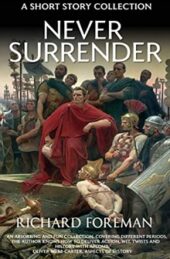Richard, Can you tell us about your latest Spies of Rome title and how you came to write the novella?
I often receive emails from readers asking about when the next book in a series will be. I get more mail than most about Spies of Rome. So I decided to write a series of novellas (the first of which, Blood & Poison, was published last year) to accompany the novels. I was away on holiday late summer and had time to write a first draft of Spies of Rome: Gladiator.
One could say that I chose the subject due to being fascinated by gladiators, but the honest answer is that I wanted to capitalise on the release of Gladiator II, that’s coming out in November.
The plot is pretty simple, in terms of the hero (or anti-hero) Rufus Varro being asked by Marcus Agrippa to investigate a childhood friend, who is now a politician and one of the wealthiest citizens in Rome. In the course of doing so Varro visits the senator’s gladiator school. There are plenty of ingredients in Spies of Rome: Gladiator which are also in the previous books in the series. There’s satire, history, action and a twist in the tale.
I enjoy spending time in the company of Rufus Varro. He’s a reluctant spy and far from the hardest-working poet in the world (although the bar is set low on that front, I dare say). Varro is not completely devoid of courage and decency, however, beneath his amorality and apathy. In most regards, the only thing he cares about is his indifference.
Why do you think gladiatorial combat proved so popular in Ancient Rome?
It was a release and spectacle. Human beings are not altogether pleasant and peaceful creatures. We’re prone to cruelty and baying for blood. Are we not entertained by violence? Just check out the number of YouTube hits on certain videos of people punching one another.
One of the parallels today is the enduring popularity of boxing, which in some respects is not a million miles away from gladiatorial combat. If you scan across the audience at a fight you will see young and old – and men and women (and doubtless the other dozen plus genders that the Scottish National Party has recently identified).
As with a football stadium today, the arena was also a place for people to come together, to drink and gamble at cheer on their favourites. The likes of Cicero and Seneca may speak of the good life and Roman virtues, but Rome was a city of vice. Poetry readings may have duly been competitive affairs in Rome, but the contests were not as compelling as gladiatorial bouts for the majority of citizens.
Are you looking forward to watching the forthcoming movie?
Of course. Anything with Denzil Washington in will not be a complete waste of time. I’d also be willing to pay twice the cover price of a ticket if he could quote the Oliver Reed line of “You sold me queer giraffes.”
Advance word of mouth has been favourable, thankfully. It’ll be a spectacle. I go to the cinema for entertainment rather than historical accuracy, but I hope there are not too many liberties taken.
I love the first film. It reminds you of why one should love cinema and go to a proper auditorium to immerse oneself in a story and setting. I hope Gladiator II proves a huge success, not just because I’ll sell more books of the back of it.
Neither you nor Rufus Varro seem enamoured with politicians in the Spies of Rome series. More often than not they are villains, or certainly ripe for satire.
I can’t say I’m a fan of politicians (poets seldom come off well, either, in the books). There are few statesmen I admire. Most careers do not end well in politics, which is partly why Augustus Caesar stands out for his longevity and success.
I suspect that there was often a plot by some faction to undermine Augustus during his reign. Power breeds resentment and envy. The Senate House would have been the Conservative Party on steroids. There was always a back to sheath a knife in. It is a shame that we do not have a wealth of material on such in-fighting and plots. After Cicero’s death a light goes out in relation to information and gossip at what was happening in Roman politics.
Are you planning to write another Spies of Rome book?
Yes, I’ll aim to write another novella next year. I just need to fit it around other projects. I have no to little idea as to what it will be about, although I may arrange for Varro to meet Virgil. I certainly liked writing about the young Ovid in Spies of Rome: Blood & Vengeance.
I thoroughly enjoy writing the series and I hope that people will continue to enjoy the books – although it’s doubtful that what I do in this life will echo in eternity.
Richard Foreman is a bestselling writer and the author of






